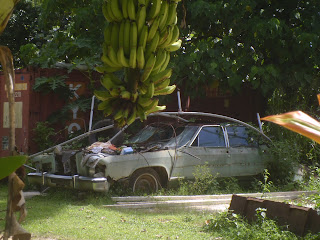The last (or lost) kingdom
"Oh yes, our daughter will arrive Friday, before we'll
go back to Auckland together mid-April", a conversation across the tables
at Cafė Escape - a recently opend, self-named Sophisticated Cafė with a Tongan Twist,
located in one of the two new shopping arcades in what could be called the
centre of the capital Nuku'alofa - passed over my head. I ordered a cappuccino
opting finally for the passion-fruit cheese cake, though the lemon-creme tart next
did look delicious too. Meanwhile another Tongan couple found their way into
the air-conditioned oasis. "Oh, how are you, when did you arrive?",
followed by a few local phrases in exchange. "Oh, is it? You should join
our club", some English is thrown into the conversations. "Join
what?", came into my mind, "The club of 200 pounds plus?" And my
sarcastic thoughts were not about money but weight ... body weight. I had the
impression the only person not greeted warmly was an adolescent yet missing
some 25 pounds to join my imaginary club. Whatsoever, they all - obviously from
the more wealthy part of Tongan society - seem to live abroad, visiting
"home" during the Easter holidays. The last kingdom of the south
pacific is also the most "Christian" nation in the vast pacific triangle
in-between Hawaii, New Zealand and Easter Island.
Off course, I can't expect the Kingdom of Tonga to remain the
same as I kept it in my memories: the women selling smoked octopus next the old
jetty, as well as "my" old Victorian-style white wooden guesthouse
along the beach road, which had to make way for the new Chinese Embassy. Nor
may I blame the extended period of bad weather, turning roads and gardens in
town into wetlands.
Still, the "last" kingdom seems to struggle on
its path into the new millennium when the king decided to catapult his people from
the end of the international dateline to the first nation to celebrate a new
day. The first social unrest among the Tongan people in the unified kingdom's
history - escalating in riots in 2006 - might have been the tipping point of
the effects of ongoing changes in a time of accelerated globalization. And
while Tongans have to learn how to get along with the changes, they still pay
the price of the 2006 riots: a poor performing economy with limited capacity to
generate income, be it for investments or maintenance. Certainly, "Cafė
Escape" won't be the solution. Nor the few "sightseeing
tourists" from one of the cruising boats on its way up to Hawaii.




Comments
Post a Comment